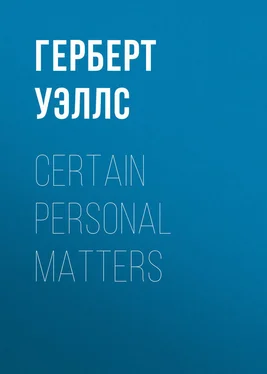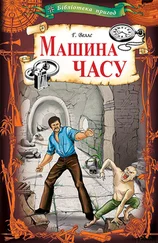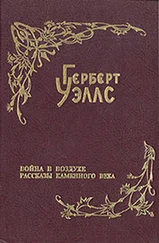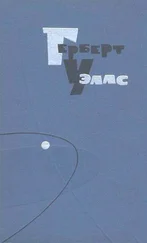Герберт Уэллс - Certain Personal Matters
Здесь есть возможность читать онлайн «Герберт Уэллс - Certain Personal Matters» — ознакомительный отрывок электронной книги совершенно бесплатно, а после прочтения отрывка купить полную версию. В некоторых случаях можно слушать аудио, скачать через торрент в формате fb2 и присутствует краткое содержание. Жанр: foreign_antique, foreign_prose, на английском языке. Описание произведения, (предисловие) а так же отзывы посетителей доступны на портале библиотеки ЛибКат.
- Название:Certain Personal Matters
- Автор:
- Жанр:
- Год:неизвестен
- ISBN:нет данных
- Рейтинг книги:3 / 5. Голосов: 1
-
Избранное:Добавить в избранное
- Отзывы:
-
Ваша оценка:
- 60
- 1
- 2
- 3
- 4
- 5
Certain Personal Matters: краткое содержание, описание и аннотация
Предлагаем к чтению аннотацию, описание, краткое содержание или предисловие (зависит от того, что написал сам автор книги «Certain Personal Matters»). Если вы не нашли необходимую информацию о книге — напишите в комментариях, мы постараемся отыскать её.
Certain Personal Matters — читать онлайн ознакомительный отрывок
Ниже представлен текст книги, разбитый по страницам. Система сохранения места последней прочитанной страницы, позволяет с удобством читать онлайн бесплатно книгу «Certain Personal Matters», без необходимости каждый раз заново искать на чём Вы остановились. Поставьте закладку, и сможете в любой момент перейти на страницу, на которой закончили чтение.
Интервал:
Закладка:
The visitor is fortunate who leaves no marketable impression behind. The literary entertainers eye you over, as if they were dealers in a slave mart, and speculate on your uses. They try to think how you would do as a scoundrel, and mark your little turns of phrase and kinks of thought to that end. The innocent visitor bites his cake and talks about theatres, while the meditative person in the arm-chair may be in imagination stabbing him, or starving him on a desert island, or even – horrible to tell! – flinging him headlong into the arms of the young lady to the right and "covering her face with a thousand passionate kisses." A manuscript in the rough of Euphemia's, that I recently suppressed, was an absolutely scandalous example of this method of utilising one's acquaintances. Mrs. Harborough, who was indeed Euphemia's most confidential friend for six weeks and more, she had made to elope with Scrimgeour – as steady and honourable a man as we know, though unpleasant to Euphemia on account of his manner of holding his teacup. I believe there really was something – quite harmless, of course – between Mrs. Harborough and Scrimgeour, and that, imparted in confidence, had been touched up with vivid colour here and there and utilised freely. Scrimgeour is represented as always holding teacups in his peculiar way, so that anyone would recognise him at once. Euphemia calls that character. Then Harborough, who is really on excellent terms with his wife, and, in spite of his quiet manner, a very generous and courageous fellow, is turned aside from his headlong pursuit of the fugitives across Wimbledon Common – they elope, by the bye, on Scrimgeour's tandem bicycle – by the fear of being hit by a golf ball. I pointed out to Euphemia that these things were calculated to lose us friends, and she promises to destroy the likeness; but I have no confidence in her promise. She will probably clap a violent auburn wig on Mrs. Harborough and make Scrimgeour squint and give Harborough a big beard. The point that she won't grasp is, that with that fatal facility for detail, which is one of the most indisputable proofs of woman's intellectual inferiority, she has reproduced endless remarks and mannerisms of these excellent people with more than photographic fidelity. But this is really a private trouble, though it illustrates very well the shameless way in which those who have the literary taint will bring to market their most intimate affairs.
ON SCHOOLING AND THE PHASES OF MR. SANDSOME
I do not know if you remember your "dates." Indeed, I do not know if anyone does. My own memory is of a bridge; like that bridge of Goldsmith's, standing firm and clear on its hither piers and then passing into a cloud. In the beginning of days was "William the Conqueror, 1066," and the path lay safe and open to Henry the Second; then came Titanic forms of kings, advancing and receding, elongating and dwindling, exchanging dates, losing dates, stealing dates from battles and murders and great enactments – even inventing dates, vacant years that were really no dates at all. The things I have suffered – prisons, scourgings, beating with rods, wild masters, in bounds often, a hundred lines often, standing on forms and holding out books often – on account of these dates! I knew, and knew well before I was fifteen, what these "heredity" babblers are only beginning to discover – that the past is the curse of the present. But I never knew my dates – never. And I marvel now that all little boys do not grow up to be Republicans, seeing how much they suffer for the mere memory of Kings.
Then there were pedigrees, and principal parts and conjugations, and county towns. Every county had a county town, and it was always on a river. Mr. Sandsome never allowed us a town without that colophon. I remember in my early manhood going to Guildford on the Wey, and trying to find that unobtrusive rivulet. I went over the downs for miles. It is not only the Wey I have had a difficulty in finding. There are certain verses – Heaven help me, but I have forgotten them! – about " i vel e dat" ( was it dat?) "utrum malis" – if I remember rightly – and all that about amo, amas, amat . There was a multitude of such things I acquired, and they lie now, in the remote box-rooms and lumber recesses of my mind, a rusting armoury far gone in decay. I have never been able to find a use for them. I wonder even now why Mr. Sandsome equipped me with them. Yet he seemed to be in deadly earnest about this learning, and I still go in doubt. In those early days he impressed me, chiefly in horizontal strips, with the profoundest respect for his mental and physical superiority. I credited him then, and still incline to believe he deserved to be credited, with a sincere persuasion that unless I learnt these things I should assuredly go – if I may be frank – to the devil. It may be so. I may be living in a fool's paradise, prospering – like that wicked man the Psalmist disliked. Some unsuspected gulf may open, some undreamt-of danger thrust itself through the phantasmagoria of the universe, and I may learn too late the folly of forgetting my declensions.
I remember Mr. Sandsome chiefly as sitting at his desk, in a little room full of boys, a humming hive whose air was thick with dust, as the slanting sunbeams showed. When we were not doing sums or writing copies, we were always learning or saying lessons. In the early morning Mr. Sandsome sat erect and bright, his face animated, his ruddy eyes keen and observant, the cane hanging but uncertainly upon its hook. There was a standing up of classes, a babble of repetition, now and then a crisis. How long the days were then! I have heard that scientific people – Professor C. Darwin is their leader, unless I err – which probably I do, for names and dates I have hated from my youth up – say the days grow longer. Anyhow, whoever says it, it is quite wrong. But as the lank hours of that vast schooltime drawled on, Mr. Sandsome lost energy, drooped like a flower, – especially if the day was at all hot, – his sandy hair became dishevelled, justice became nerveless, hectic, and hasty. Finally came copybooks; and yawns and weird rumblings from Mr. Sandsome. And so the world aged to the dinner-hour.
When I had been home – it was a day school, for my aunt, who had an appetite for such things, knew that boarding-schools were sinks of iniquity – and returned, I had Mr. Sandsome at another phase. He had dined – for we were simple country folk. The figurative suggestions of that "phase" are irresistible – the lunar quality. May I say that Mr. Sandsome was at his full? We now stood up, thirty odd of us altogether, to read, reading out of books in a soothing monotone, and he sat with his reading-book before him, ruddy as the setting sun, and slowly, slowly settling down. But now and then he would jerk back suddenly into staring wakefulness as though he were fishing – with himself as bait – for schoolboy crimes in the waters of oblivion – and fancied a nibble. That was a dangerous time, full of anxiety. At last he went right under and slept, and the reading grew cheerful, full of quaint glosses and unexpected gaps, leaping playfully from boy to boy, instead of travelling round with a proper decorum. But it never ceased, and little Hurkley's silly little squeak of a voice never broke in upon its mellow flow. (It took a year for Hurkley's voice to break.) Any such interruption and Mr. Sandsome woke up and into his next phase forthwith – a disagreeable phase always, and one we made it our business to postpone as long as possible.
During that final period, the last quarter, Mr. Sandsome was distinctly malignant. It was hard to do right; harder still to do wrong. A feverish energy usually inspired our government. "Let us try to get some work done," Mr. Sandsome would say – and I have even known him teach things then. More frequently, with a needless bitterness, he set us upon impossible tasks, demanding a colossal tale of sums perhaps, scattering pens and paper and sowing the horrors of bookkeeping, or chastising us with the scorpions of parsing and translation. And even in wintry weather the little room grew hot and stuffy, and we terminated our schoolday, much exhausted, with minds lax, lounging attitudes, and red ears. What became of Mr. Sandsome after the giving-out of home-work, the concluding prayer, and the aftermath of impositions, I do not know. I stuffed my books, such as came to hand – very dirty they were inside, and very neat out with my Aunt Charlotte's chintz covers – into my green baize bag, and went forth from the mysteries of schooling into the great world, up the broad white road that went slanting over the Down.
Читать дальшеИнтервал:
Закладка:
Похожие книги на «Certain Personal Matters»
Представляем Вашему вниманию похожие книги на «Certain Personal Matters» списком для выбора. Мы отобрали схожую по названию и смыслу литературу в надежде предоставить читателям больше вариантов отыскать новые, интересные, ещё непрочитанные произведения.
Обсуждение, отзывы о книге «Certain Personal Matters» и просто собственные мнения читателей. Оставьте ваши комментарии, напишите, что Вы думаете о произведении, его смысле или главных героях. Укажите что конкретно понравилось, а что нет, и почему Вы так считаете.








